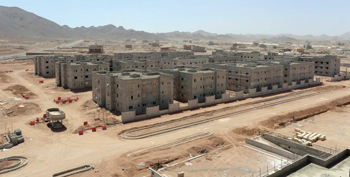4,700 ‘active’ projects in kingdom
01 December 2017
The construction sector in Saudi Arabia is poised for solid growth, with over 4,700 active construction projects worth $852.3 billion and more than 700 projects set to begin work in the next few months, said a report released ahead of a major industry event to be held next year in Jeddah.
The eighth edition of The Big 5 Saudi, a premier construction event in the region, will run from March 5 to 8 at the Jeddah Centre for Forums & Events.
Of these active projects, around 170 are worth $1 billion or more, stated the report prepared by BNC Network for Big 5 Saudi, indicating the tremendous growth potential of the kingdom’s construction market.
Nineteen months after its announcement, Saudi Vision 2030 is proving effective, with the kingdom’s construction sector showing increased growth potential, said the report titled ‘Saudi Arabia’s Construction Market Overview 2018 and Beyond’.
Currently, there are $284.3 billion worth of projects in the early stages of development in Saudi Arabia, it stated.
Thanks to recent reforms and renewed spending, construction activities are picking up after the slowdown that affected the industry over the past two years, the report added.
According to the BNC report, the ambitious Saudi Vision 2030’s plan to diversify the economy away from oil is driving construction activities in both residential and non-residential segments. Reforms aimed at increasing the private sector’s contribution in growth industries such as mining, manufacturing, and health care, are offering new investment opportunities in the form of joint ventures or public-sector partnerships, it added.
“Today, there are over 3,300 projects in the urban construction sector, which represent approximately 70 per cent of all construction activities in Saudi Arabia,” revealed Nathan Waugh, portfolio event director of The Big 5 Saudi. “Housing is indeed the most significant area of expenditure under the Saudi plan, aiming to grow the real estate sector contribution to GDP (gross domestic product) from five per cent to 10 per cent by 2030.”
- 4,700 ‘active’ projects in kingdom
- Turkey’s Mapa wins $262m water transmission deal
- World-class leisure city on way for Riyadh
- Kapsarc named kingdom’s smartest
- Al Kifah launches ‘green concrete
- Rosatom to bid for big nuclear plant projects
- KAEC inks $533m project agreements



